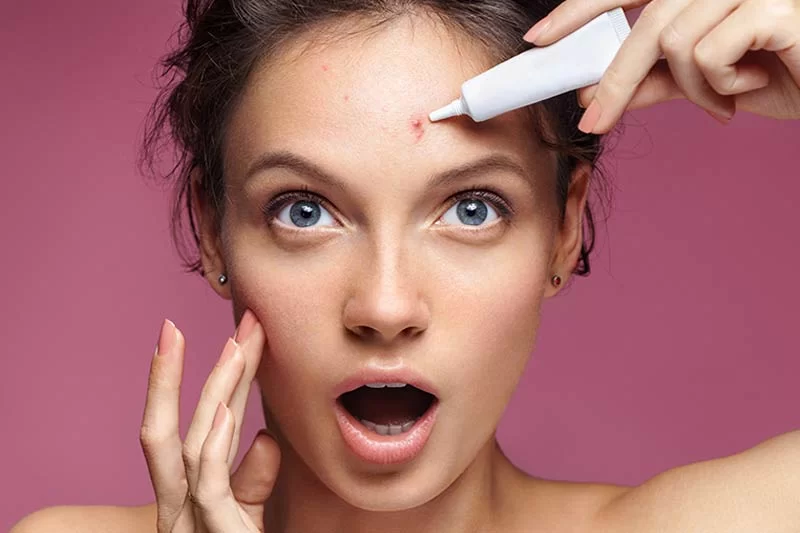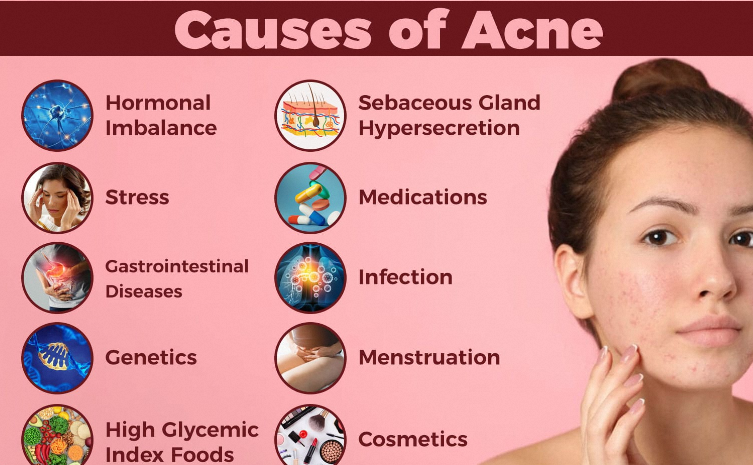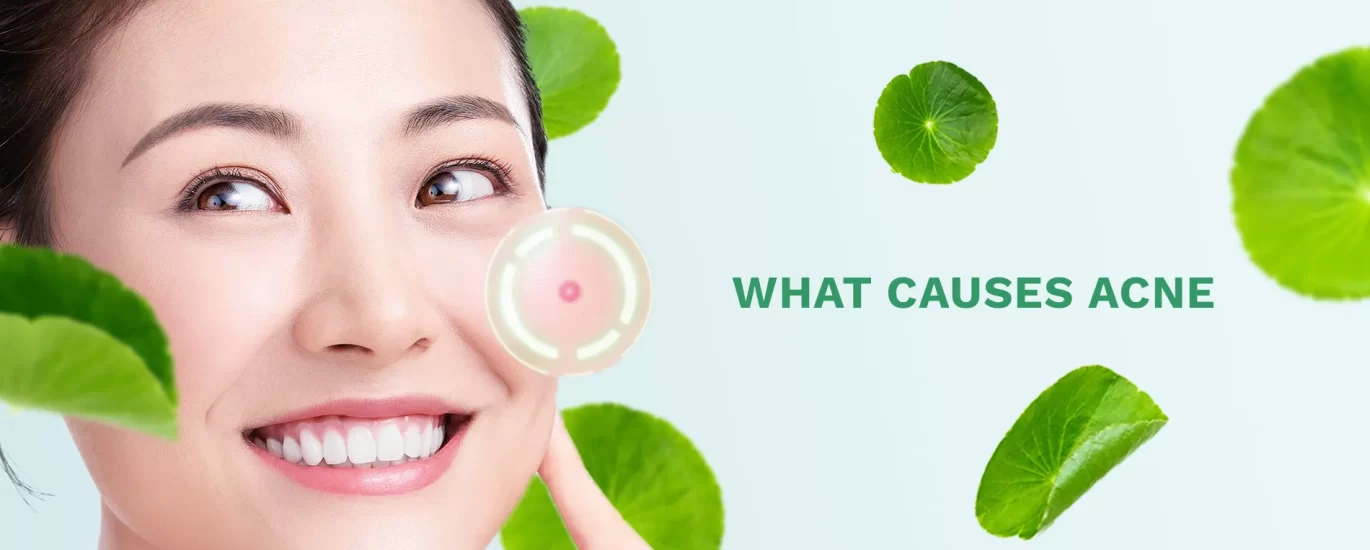Why the Breakouts? Unveiling the Causes of Acne
Acne, a common skin condition affecting millions globally, can manifest in various forms, from mild whiteheads to painful cysts. While not life-threatening, acne can significantly impact self-esteem and confidence. Understanding the root causes of acne empowers you to take control of your skin. This article delves into the science behind acne breakouts, exploring the key factors that contribute to this frustrating condition.
The Culprit Within: Hormones and Acne
Hormonal fluctuations play a significant role in acne development. Here’s how they can trigger breakouts:
- Androgens: During puberty, both boys and girls experience an increase in androgen levels, hormones that stimulate oil production in the skin. This excess oil can clog pores and create an environment for bacteria to thrive, leading to acne breakouts.
- Menstrual Cycle: For women, hormonal changes throughout the menstrual cycle can contribute to acne flare-ups. The days leading up to a period are often associated with increased acne due to hormonal fluctuations.
- Polycystic Ovary Syndrome (PCOS): Women with PCOS may experience hormonal imbalances that can manifest as acne, along with other symptoms like irregular periods and excess hair growth.
It’s important to note that hormonal acne is not always limited to puberty and menstruation. Certain medications, stress, and underlying health conditions can also disrupt hormone balance and contribute to breakouts.
Clogged Pores: The Battlefield of Acne
Acne occurs when pores become clogged with a combination of factors:
- Excess Sebum (Oil) Production: As mentioned earlier, hormonal changes can trigger the sebaceous glands to produce more oil. This excess oil can clog pores, creating a breeding ground for bacteria.
- Dead Skin Cells: Skin naturally sheds dead cells. However, when these cells don’t shed properly, they can accumulate on the skin’s surface and contribute to pore blockage.
- Bacteria: Propionibacterium acnes (P. acnes) is a type of bacteria naturally present on the skin. When pores become clogged, P. acnes bacteria can multiply rapidly, leading to inflammation and the development of pimples.
While bacteria play a role, it’s not the sole culprit. Acne is a complex interplay between excess oil, dead skin cell buildup, and the body’s inflammatory response to these factors.
Beyond Hormones and Oil: Other Triggers for Acne Breakouts
While hormonal fluctuations and excess oil production are major players in acne development, other factors can contribute to breakouts:
- Diet: Research suggests a potential link between a diet high in processed foods, sugary drinks, and dairy products and acne breakouts. These foods can trigger blood sugar spikes and contribute to inflammation, potentially worsening acne in some individuals.
- Stress: While stress doesn’t directly cause acne, it can exacerbate existing breakouts. Stress hormones can increase oil production and worsen inflammation, leading to more noticeable acne.
- Medications: Certain medications, such as birth control pills containing progesterone or corticosteroids, can trigger acne breakouts in some people.
- Genetics: If you have a family history of acne, you’re more likely to develop the condition. Genetics play a role in how your skin responds to hormonal changes and oil production.
Understanding your individual triggers is crucial for managing acne. Keeping a journal to track your diet, stress levels, and menstrual cycle can help you identify potential triggers and adjust your lifestyle accordingly.
Beyond the Surface: Internal Factors and Acne
While most people associate acne with external factors, some internal contributors can also play a role:
- Gut health: A growing body of research suggests a potential link between gut health and skin health. An imbalance in gut bacteria may contribute to inflammation throughout the body, potentially impacting acne development.
- Underlying health conditions: Certain medical conditions, such as polycystic ovary syndrome (PCOS) and Cushing’s syndrome, can disrupt hormone balance and lead to acne breakouts. Consulting a doctor to rule out any underlying conditions is crucial, especially if your acne is persistent or unresponsive to traditional treatments.
It’s important to consult a healthcare professional if you suspect an underlying medical condition might be contributing to your acne. They can perform necessary tests and recommend the appropriate course of action.
Acne: A Multifaceted Issue
Understanding the various factors that contribute to acne is crucial for effective management. Acne is not simply a matter of hygiene or diet, but rather a complex interplay of hormones, oil production, bacteria, and potentially, internal factors. By recognizing your personal triggers and adopting a multi-pronged approach that may include skincare routine adjustments, dietary modifications, and stress management, you can take control of your acne and achieve clearer, healthier skin.
Remember: Seeking Professional Guidance is Key
While understanding the causes of acne is empowering, navigating its management and treatment can be complex. Here’s why seeking professional guidance is crucial:
- Accurate Diagnosis: Acne can manifest in various forms, and a dermatologist can accurately diagnose the specific causes of acne you have. This is crucial for determining the most suitable treatment approach.
- Personalized Treatment Plan: There’s no “one-size-fits-all” solution for acne. A dermatologist can create a personalized treatment plan tailored to your unique needs, considering factors like acne type, severity, and underlying triggers.
- Monitoring and Adjustments: Treatment plans may need to be adjusted over time as your skin responds and your hormones fluctuate. A dermatologist can monitor your progress and adjust your treatment plan as needed.
- Addressing Underlying Conditions: If an underlying health condition contributes to your acne, a dermatologist can work with your doctor to address it, potentially improving your overall skin health.
- Minimizing Risks: Certain acne medications can have side effects. A dermatologist can guide you on safe and effective treatment options and monitor for any potential side effects.
Remember, consulting a dermatologist is crucial for effectively managing acne and achieving your desired results. They possess the expertise and experience to guide you through the journey towards clearer, healthier skin.
Conclusion: Unveiling the Mystery and Taking Control
Acne, while frustrating, is not a mystery. Understanding the various factors that contribute to its development empowers you to take control of your skin. By incorporating a combination of lifestyle modifications, targeted skincare practices, and potentially, professional guidance from a dermatologist, you can manage your acne effectively and achieve clearer, healthier skin. Remember, consistency, patience, and seeking expert advice are key to unlocking the secrets to clearer, more confident skin.





